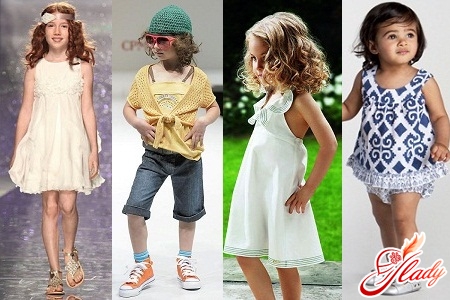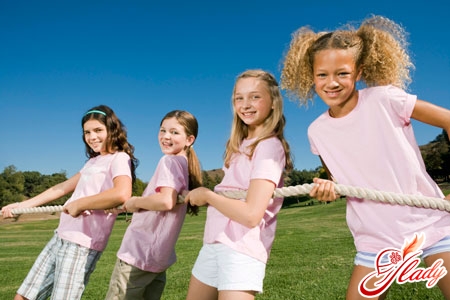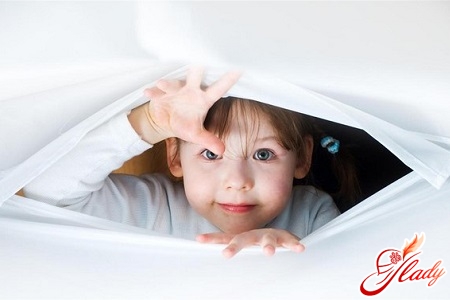 Children's fears ... What is it and how with themfight? As a rule, the reaction of adults to the fears of children is very different. Some parents begin to panic and immediately are taken to give their beloved child sedatives. Others simply do not pay any attention to the experiences of the child, believing that eventually it will pass by itself. Still others begin to scold and even punish an innocent child, believing that he has invented all the fears in order to obtain certain indulgences in discipline and additional privileges. And only a small part of the parents make the right decision and applies for the qualified help of a child psychologist. But this is absolutely correct, because ignoring children's fears can significantly aggravate the situation and lead to the emergence of such a formidable complication as children's neurosis, which requires serious treatment, often in a hospital. Timely work of a psychologist with childish fears will help eradicate the problem at the very beginning of its development. Even if the neurosis has been avoided, the fears of the child, left unattended, can cause significant harm to the child's psyche. After all, many of the complexes and phobias inherent in adults, originate in childhood.
Children's fears ... What is it and how with themfight? As a rule, the reaction of adults to the fears of children is very different. Some parents begin to panic and immediately are taken to give their beloved child sedatives. Others simply do not pay any attention to the experiences of the child, believing that eventually it will pass by itself. Still others begin to scold and even punish an innocent child, believing that he has invented all the fears in order to obtain certain indulgences in discipline and additional privileges. And only a small part of the parents make the right decision and applies for the qualified help of a child psychologist. But this is absolutely correct, because ignoring children's fears can significantly aggravate the situation and lead to the emergence of such a formidable complication as children's neurosis, which requires serious treatment, often in a hospital. Timely work of a psychologist with childish fears will help eradicate the problem at the very beginning of its development. Even if the neurosis has been avoided, the fears of the child, left unattended, can cause significant harm to the child's psyche. After all, many of the complexes and phobias inherent in adults, originate in childhood.
The essence of childish fear
What is childish fears and what is their natureorigin? Fear is the emotional reaction of the psyche to the impact of threatening factors. However, as the psychoanalysis of children's fears shows, their specificity is such that, as a rule, there is no real threat, and the very appearance of the problem is due to a very rich and vivid imagination of children. The source for the imagination of the child is his environment, in particular, adults who are overly emotionally discussing in the presence of children the problems of fires, natural disasters, accidents and other accidents. Children's nightly fears can be caused by watching horror movies. Often it seems to us that the child is busy with his own affairs and does not pay any attention to what is happening on the screen. However, in fact, this impression is very deceptive - the kid, like a sponge, absorbs all the information. And since he is not always able to distinguish truth from fiction to the end, it subsequently leads to the emergence of childish fears. 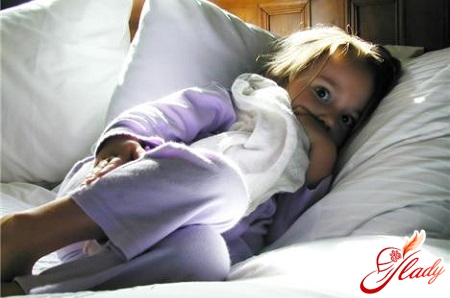
The causes of fears in children
There are also many different prerequisitesfor the development of fears in children. The causes of their occurrence are often hidden much deeper than it seems. Where adults do not know how to look for them. Psychologists call the main ones:
Diagnosis of childhood fears
An important part of the work of a psychologistwith childish fears lies in their diagnosis and the establishment of causes. As a rule, for children's psychologists the diagnosis of childhood fears is not difficult. All of them are very similar to each other. Every psychologist has his own method of identifying children's fears. But in general, in essence, they are all very similar and based on the main typical features of the child's psyche. Absolutely any method of diagnosing children's fears sets a goal to identify not only the types of psychological illness, but also the cause of its occurrence. Some specialists use drawing for this, others - molding, while others prefer talking with the baby. It is difficult to name the best diagnosis of children's fears, because all these methods give equally effective results, and when choosing a method, it is necessary to take into account a number of individual psychological and age characteristics of each child. The classification of children's fears distinguishes two main types:
- Fear of the child before punishment for anymisdemeanor And the error can be so insignificant that adults simply will not pay any attention to it. The presence of such fears indicates serious problems in the child's relationship with parents, and sometimes even may result from excessive strict treatment of the baby. In case of occurrence of such fear, parents should seriously think about their behavior patterns with the child and revise it, in order to avoid serious problems.
- Fear of blood Very many children at the sight of a smalldroplets of blood, appearing from a peeled knee, begin to scream with such force that you might think that a wound is not a small scratch, but a skin shot alive, which, in addition, is sprinkled with a pack of salt. In fact, the child screams not with pain, but with panic fear. This is absolutely uncontrollable feeling for the child, so you should not laugh at it. Fear of blood is caused most often by a banal ignorance of physiology - the baby seems that all the blood will flow out and he will die. Strictly speaking, the fear of blood is a derivative of the fear of death.
- The death of parents is also a fairly common type of childish fears, often born of the same adults.
As you can see for yourself, not always thatthe fact that a child does not tell his parents about his fears means that they do not really exist. In the event that parents deny the phenomenon of childhood fears as such, and, accordingly, do not see the need to work with them, they can be asymptomatic. However, in such a case, the negative consequences for the child's psyche will be many times heavier than if the parents recognized the problem and helped the child to overcome childhood fears. However, those parents who themselves have a suspicious nature and excessive impressionability, can also aggravate the situation by creating unnecessary turmoil around it, thereby concentrating and fixing the attention of the baby on the existing problem. But the work with children's fears is just to identify the fears and make the child forget them, not focusing on them the attention of the child. Sometimes even there are situations in which parents involuntarily, at a subconscious level, can project their own fears on their children. This is usually a fear of the death of parents, which sooner or later is experienced by any child, fear of punishment (most often found in men). As a rule, if parents manage to find their common fears with children, overcoming them becomes much faster and easier. 
Identify the causes of childhood fears
As already mentioned, in order to successfullyto overcome the fears of the child, it is necessary, with the help of psychoanalysis, to find out their causes. At home, you can use several simple, accessible methods for parents to identify children's fears, which give a very accurate picture of the nature of the problem:
- Drawing Even if your child does nothas special artistic talents, you can ask him to draw something that disturbs him. However, the request should be in a very gentle tactful form and in no case should be an orderly nature. Molding of plasticine will suit those children who do not like to draw. Recommendations to parents in this case are absolutely identical.
- If the above method did not help determinethe reasons for the occurrence of childhood fears, you can offer the child to come up with a fairy tale that will tell exactly what disturbs the baby. Typically, this method is ideal for determining children's fears after five years. Be sure to write the story on paper. First, thus visualization of fears is performed, which is the task of absolutely any diagnostic technique, and secondly, it can be useful to you in the future, in case of repeated occurrence of anxiety and fears in the child.
Another effective way of how to winfears of children, is a conversation with the child on an exciting topic. An adult person who has a conversation with a child should seriously approach this issue and consider in advance a list of questions that he will ask the child. Also, note that all questions are asked at an accessible level for children's understanding. Do not rush the child with an answer, you need to give him time to think. In no case should focus on any one reason, as this can lead to a new fear.
Classification of childhood fears by age
There are various classifications of childrenfears, understandable only to psychologists, so there is no sense in bringing them all. However, below is the most complete list of frequently occurring childhood fears, taking into account age features, because this syndrome is different in different age categories. Children's fears in children from 0 to 3 years
- How strange it may seem, but childrenthe first year of life are also prone to childish fears. For example, it may be fear of a new environment. Surely any mom noticed how the baby is changing, it's worth it to get into an unfamiliar room.
- Also, the children have a fear of losing their motherIt is so common that it simply does not make sense to describe the problem. However, unfortunately, very often such fear is taken for the spoiledness and whims of the child.
- At the age from one to three years there are newchildren's fears, involuntary culprits become parents crumbs For example, the fear of darkness, when the child scare "babeika" and other mythical characters.
- There is also the child's fear of being aloneeven for a minute. As a rule, it arises precisely because the elementary need of a baby in parents in the first year of life was considered by adults for their usual spoiledness, and the child was deprived of constant close contact with his mother.
- Night fears. In most cases, they are a continuation of the fear of darkness. Remember that watching some modern cartoons can significantly exacerbate the situation.
Children's fears in children 3-5 years For the age category of three to five years, the most typical are such fears as:
- Panic fear of loneliness;
- Fear of darkness.
- Also at this age, some parentsthey are surprised to see that their crumbs have a fear of enclosed space, for example, a child may refuse to enter the elevator or start demanding that the door to the bedroom be left open. Psychocorrection of such childish fear is mandatory, otherwise this fear may emerge in adulthood, resulting in claustrophobia.
- Children's nighttime fear at this age is caused by fairy-tale characters, so the child at this age identifies them with quite real people.
Fears in children 5-7 years At the age of 5-7 yearssyndromes of children's pathological fears become much more diverse. The horizon of the child expands, and with it, new fears may appear in the life of the little man.
- For example, night fears at age 7 acquirea new form - the child begins to be afraid to fall asleep, because in a dream he sees terrible dreams. And this is a very serious strain on the nervous system of the child, therefore correction of night fears of 7 years is simply obligatory.
- There is a fear of punishment. As already mentioned, this is a very disturbing signal that not everything is in order with the relations between parents and children. Psycho-correction of children's fears before punishment should begin with a change in the parents' approach to the process of raising a child. It has long been recognized that the physical effect on the baby does not bring anything but harm.
- Under the influence of adult conversations andwatching TV shows a child may have an insurmountable fear of animals, most often dogs. By the way, often adults increase this fear by over-conserving the child.
- At this age the child is faced with sucha sad phenomenon of human life, like death. However, to realize until the end of this child can not yet, and therefore the baby has a fear of his own death, the death of his parents.
- In addition, the fear of death in the child, as a consequence, entails the emergence of fear of all sorts of fires, natural disasters, accidents and so on.
Fears in children 7-11 years Children in the age range from 7 to 11 years, new fears associated with a new stage in their lives.
- Fear of the school.
- Fear of the team, caused by complex adaptation.
- Fears of getting a bad evaluation.
Within the framework of the program for correcting children's fearspsychologists give some very useful recommendations to parents. After all, it is scientifically proven that in 95% of all cases of childish fears, the mom and dad of the baby are directly or indirectly involved in this. 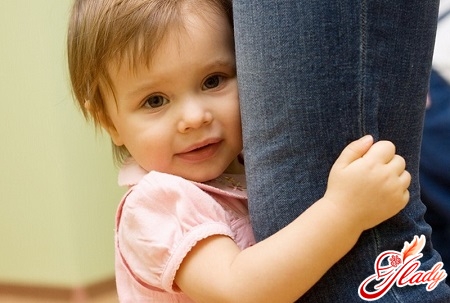
Recommendations on the prevention of childhood fears
- To take care of the psychological health of the childit is necessary to begin before his birth. Children's psychologists note an interesting pattern - the more quietly pregnancy took place, the less often in children there are any childish fears. So try, no matter how trite it may sound, less nervous during pregnancy.
- Recommendation for Mom: whatever high position you occupy at work, remember that the child is not your subordinate, he does not need a strict leader, but a gentle and loving mother. It is noticed that in children of imperious, strict mothers, fears are encountered much more often and in a more severe form. Treatment of childhood fears is very complex and often requires the use of pharmacological drugs.
- In no case should you not allow a childfelt abandoned and unnecessary Even if you spend almost all of your time at work or if you have a younger child, or for some other reason you do not have any strength at all, it is necessary, by overcoming yourself, to pay attention to the child. In the absence of adequate treatment of children's fears caused by a sense of their own "uselessness", in adolescence this problem can lead to the child's development of suicidal tendencies.
- However, to instil in the child a sense of ownexclusivity is also not worth Egoistic thinking also often leads to the appearance of fear of losing its exceptional position, which is characterized by an obsession.
- Try not to limit the child's communication with peers - this will lead to fears of school life.
- Never compare your child to otherschildren. In no case should you cite the child's successes in the example of his peers. This is likely to lead to a decrease in the child's self-esteem.
- Do not frighten the child with dogs, doctors or policemen. The child perceives such threats very seriously.
Speaking about how to overcome the fears of children,I would like to note the pleasant fact that, fortunately, almost all of them are temporary and perfectly amenable to correction. However, for this it is necessary that the parents take the matter seriously. In the same case, if you do not manage to cope with children's fears yourself and you do not know how to deal with their consequences, you can always seek help from a psychologist who will tell you how to get rid of the problem. As a rule, the problem can be eliminated in any, even the most difficult and neglected case, but it is advisable not to waste time, so as not to injure the child's psyche. We advise you to read:





